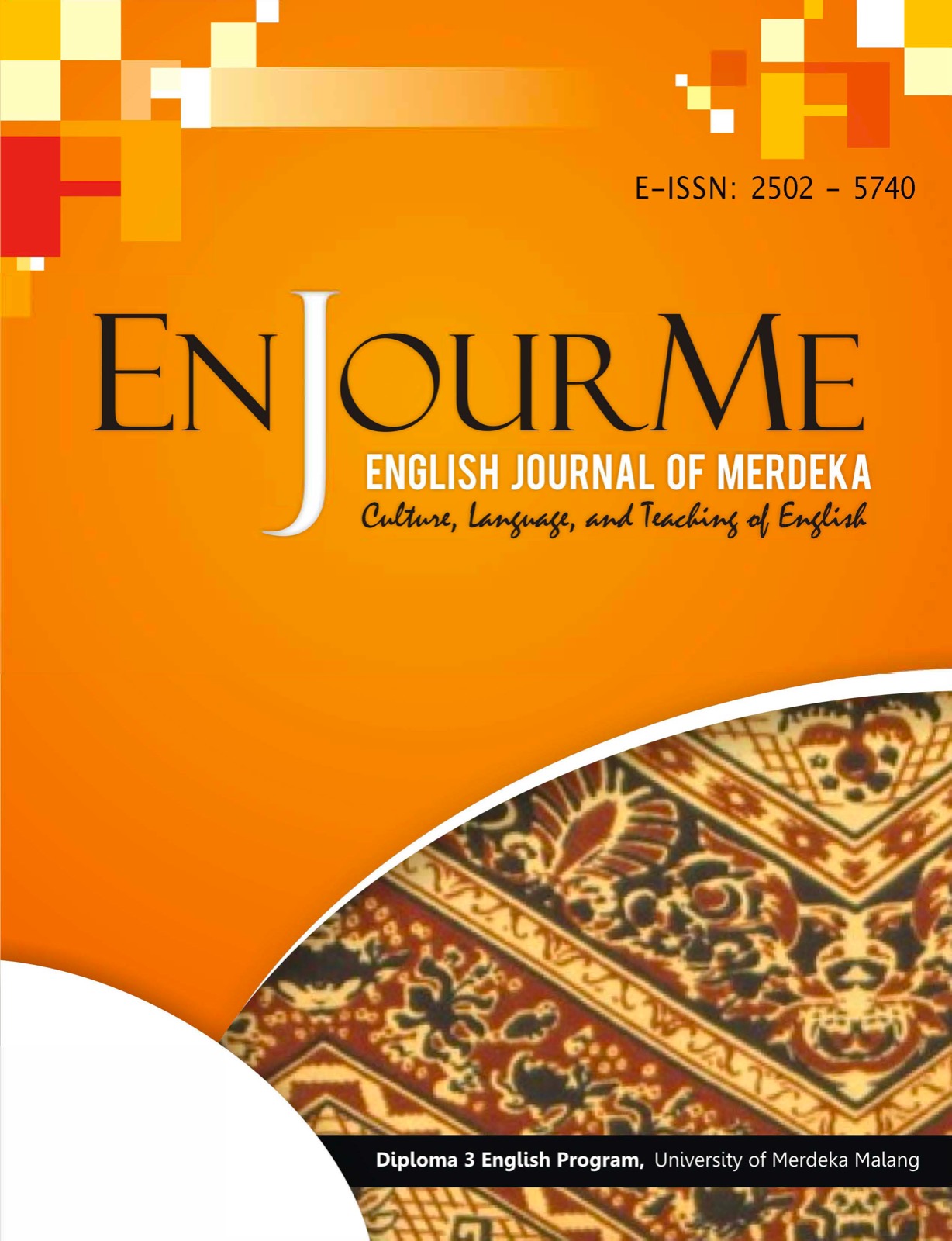An analysis: Internet slang usage as code-switching in X (Twitter)
DOI:
https://doi.org/10.26905/enjourme.v8i2.11598Keywords:
Internet Slang, Code-Switching, XAbstract
This study aimed to identify the types of internet slang used by X users as code-switching and investigate the users’ reasons for using them in their tweets. The results of this study are expected to contribute to the readers ' internet slang, such as code-switching, which is often used to communicate through X (Twitter), and to know the reasons users use slang in their tweets on Twitter. The study is qualitative, with the first data collected from Twitter. The respondents of this studyare 20 male and female active users of Twitter. The second data was collected using questionnaires. The sample was selected by purposive sampling method from different ages. The results suggest that a variety of Internet slang mostly used by X users as code-switching are capitalizations and other symbols, generated emoticons and smileys, intentional misspellings, Letter homophones, also letter repetition. There are some reasons X users use slang as code-switching in their tweets, such as to make it fresher and more personal, to playfulness or waggishness, to ease social interaction, and also to make it secret.
Downloads
References
Al-Khalifa, H. S. (2008). Twitter in academia: a case study from Saudi Arabia. eLearn, 2008(9), 1-1. (3), 222-230.
Alwasilah, A. C. (2002). Pokoknya kualitatif. Jakarta: Pustaka Jaya.
apriyanto, A. (2020). LANGUAGE AS A COMMUNICATION TOOL IN HUMAN LIFE. Fox Justi : Jurnal Ilmu Hukum, 10(02), 45–54. https://doi.org/10.58471/justi.v10i02.91
Arikunto, S. (2006). Metodologi Penelitian. Yogyakarta: Bina Aksara
Arikunto, S. (2010). Metode peneltian. Jakarta: Rineka Cipta, 173.
Astuti, C. (2020). LANGUAGE AWARENESS: LANGUAGE USE AND REASONS FOR CODE-SWITCHING. LLT Journal: A Journal on Language and Language Teaching, 23(1), 116-130. doi:https://doi.org/10.24071/llt.v23i1.2477
Bahr, L. S., & Johnston, B. (1993). Collier's encyclopedia. Collier.
Baron, N. S. (2003). Language of the Internet. The Stanford handbook for language engineers, 59-127.
Borau, K., Ullrich, C., Feng, J., & Shen, R. (2009). Microblogging for language learning: Using Twitter to train communicative and cultural competence. In Advances in Web Based Learning–ICWL 2009: 8th International Conference, Aachen, Germany, August 19-21, 2009. Proceedings 8 (pp. 78-87). Springer Berlin Heidelberg.
Budiasa, I. G., Savitri, P. W., Shanti, A. S., & Dewi, S. (2021). Slang language in Indonesian social media. Lingual: Journal of Language and Culture, 11(1), 30.
Cho, D., & Kwon, K. H. (2015). The impacts of identity verification and disclosure of social cues on flaming in online user comments. Computers in Human Behavior, 51, 363-372.
Christian, C. (2013). Code-switching keeps slang in its place “Why African Americans should speak another languageâ€. Types data [Online]. Retrieved: http://www.thecharlottepost.com/index.php?src=permalinks/News:_Code_switching_keeps_slang_in_its_place
Dewi, H. C. (2021). Code-switching used by Indonesian celebrities in social media. Deiksis,13
ELTR Journal, 7 (1), pp. 47-55
Evans, N., & Levinson, S. C. (2009). The myth of language universals: Language diversity and its importance for cognitive science. Behavioral and brain sciences, 32(5), 429-448.
Grandjean, M. (2016). A social network analysis of Twitter: Mapping the digital humanities community. Cogent Arts & Humanities, 3(1), 1171458. doi: https://doi.org/10.1080/23311983.2016.1171458
Hughes, C. E., Shaunessy, E. S., Brice, A. R., Ratliff, M. A., & McHatton, P. A. (2006). Code switching among bilingual and limited English proficient students: Possible indicators of giftedness. Journal for the Education of the Gifted, 30(1), 7-28.
Kandiawan, A. B. (2023). CODE-SWITCHING AND SLANG USED BY GEN Z INDONESIANS ON SOCIAL MEDIA. ELTR Journal, 7(1), 47-55.
Kridalaksana, H. (2013). Kamus Linguistik (edisi keempat). Gramedia Pustaka Utama.
Lailiyah, M., Wediyantoro, P., & Yustisia, K. (2019). Pre-Reading strategies on Reading comprehension of EFL Students. EnJourMe (English Journal of Merdeka) : Culture, Language, and Teaching of English, 4(2), 82 - 87. doi:https://doi.org/10.26905/enjourme.v4i2.3954
Morris, W. (2014). The American heritage dictionary of English language. Boston: Houghton Mifflin
Nguyen, C. T. (2021). How Twitter gamifies communication. Applied epistemology, 5(6), 410-436.
Paavola, J., Helo, T., Jalonen, H., Sartonen, M., & Huhtinen, A.-M. (2016). Understanding the Trolling Phenomenon: The Automated Detection of Bots and Cyborgs in the Social Media. Journal of Information Warfare, 15(4), 100–111. https://www.jstor.org/stable/26487554
Pongsapan, N. P. (2022). An Analysis of Slang Language Used In English Students’ Interaction. Jurnal Onoma: Pendidikan, Bahasa, dan Sastra, 8(2), 917-924.
Spolsky, B. (1998). Sociolinguistics. UK: Oxford University Press
Sugiyono. (2006). Metode Penelitian Kuantitatif dan Kualitatif. Bandung: C.V Alberta
Trimastuti, W. (2017). AN ANALYSIS OF SLANG WORDS USED IN SOCIAL MEDIA. Jurnal Dimensi Pendidikan dan Pembelajaran, 5(2), 64-68. doi:https://doi.org/10.24269/dpp.v5i2.497
Wei, M. (2010). Internet slang used by online Japanese anime fans. 3PM JOURNAL OF DIGITAL RESEARCH AND PUBLISHING SESSION 2• 2010, 91.
Yan, Y. (2006). World wide web and the formation of the chinese and english" internet slang union. Computer-Assisted Foreign Language Education, 1(5).
Zuckerberg, M. (2014). Facebook's CEO Zuckerberg meets Jokowi. Republika. Types data [Online]. Retrieved:http://www.republika.co.id/berita/en/nationalpolitics/14/10/13/nddxr8-facebooks-ceo-zuckerberg-meets-jokowi
Additional Files
Published
How to Cite
Issue
Section
License
Authors who publish with this journal agree to the following terms:
(1) Copyright of the published articles will be transferred to the journal as the publisher of the manuscripts. Therefore, the author confirms that the copyright has been managed by the journal.
(2) Publisher of EnJourMe (English Journal of Merdeka) : Culture, Language, and Teaching of English is University of Merdeka Malang.
(3) The copyright follows Creative Commons Attribution–ShareAlike License (CC BY SA): This license allows to Share — copy and redistribute the material in any medium or format, Adapt — remix, transform, and build upon the material, for any purpose, even commercially.




